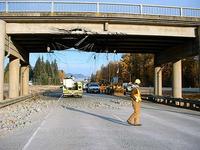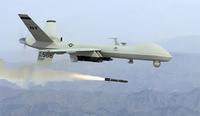-
Reid confident immigration reform bill will pass the Senate

Senate Majority Leader Harry Reid (D-Nevada) said passage of the immigration bill will be relatively easy, and that he believes the bill will be supported by at least eight Republican, in addition to votes from nearly all Democratic members.
-
-
Bloomberg group presses lawmakers to close FBI’s gun “terror gap”
New York City mayor Michael Bloomberg’s group, Mayors Against Illegal Guns, has turned its attention to Senators Kelly Ayotte (R-New Hampshire), Jeff Flake (R-Arizona), and Max Baucus (D-Montana) to gain their support for a gun bill which would prevent people on the U.S. terrorist watch list from passing background checks for guns.
-
-
Former CIA chief: NYPD surveillance would have prevented Boston-like attacks

Former CIA director Michael Hayden said a terror attack like the Boston Marathon bombings would never have taken place in New York City. Hayden, who also headed the National Security Agency (NSA), said the New York Police Department’s (NYPD) broad campaign of spying on the Muslim communities in the city would have helped officials identify the radical tendencies of the alleged bombers, thus preventing the attack.
-
-
Lawmaker offers a way to finance U.S. infrastructure investment -- with no taxpayers’ money

Representative John Delaney (D-Maryland) says has an answer to the nation’s infrastructure problems, and that it will not cost taxpayers a dime. The money will be raised through the sale of special bonds, not guaranteed by the government, to companies that earn profits outside the United States.
-
-
House panel cuts DHS chemical plant monitoring program’s budget
Budget authors in the House proposed cutting almost $9 million from what DHS had requested for high-risk chemical tracking in the 2014 fiscal year. The House Appropriations Committee, indicating its lack of confidence in DHS’s oversight of fertilizer plants like Texas’s West Fertilizer Company, which exploded earlier this year, also withheld $20 million from the program until DHS responded in detail to questions the committee sent the department.
-
-
California Democratic lawmakers want a go-slow approach to fracking
California may be on the verge of an oil rush. It is estimated that hydraulic fracturing, or fracking, at the Monterey Shale formation may tap reserves of fifteen billion barrels of oil. Democratic lawmakers do not see it that way, and have proposed numerous anti-fracking bills aiming to control the use of the controversial technology. Ten bills have been tabled so far, and more are on the way.
-
-
Chinese government hackers steal designs of advanced U.S. weapons systems
The Chinese government has been conducting a broad, sustained, and disciplined campaign of cyberattacks against U.S. government agencies, critical infrastructure, private companies, and news organizations. The public version of a study prepared for the Pentagon by the Defense Science Board now says that Chinese government hackers have also been able to penetrate the computer networks of all the major U.S. defense contractors, stealing the designs and specifications of the most advanced weapon system in the U.S. arsenal, and gaining insights into broad technologies on which U.S. military advances are based.
-
-
What we keep forgetting about immigration reform
Next month, when the Senate debates immigration reform, our elected politicians should be reminded of their responsibility to negotiate new immigration laws which finally bring sanity and fairness to all Americans and, as well, to those who would choose to become new Americans.
-
-
U.S. infrastructure drops in world infrastructure ranking

The U.S. infrastructure has slipped badly in the world’s infrastructure ranking, both in absolute and relative terms, according to the Global Competitiveness Report for 2012-13, published earlier this month by the World Economic Forum.
-
-
San Diego to receive $16.9 million in DHS funding
Some cities see DHS cutting its funding for their terrorism-related programs, but other cities see such funding increasing. A case in point is San Diego, which will receive $16.9 million in DHS funding to strengthen the city’s security against terrorist attacks.
-
-
Game changer: Russia to supply Syria with advanced S-300 air-defense systems

In what should be regarded as a major victory for Iran and its two regional allies, Syria and Hezbollah, Russia has announced it would provide Syria with advanced S-300 air defense missiles. The United States, Israel, and EU and NATO countries have been vigorously, and anxiously, pressing Russia not to go ahead with the sale of the missiles, because the deployment of the S-300 would make the imposition of a no-fly zone over Syria, let alone air attacks on targets inside Syria — like the ones Israel conducted in late January and early May — much costlier.
-
-
McCain meets with Syrian rebel leaders in Syria
Senator John McCain (R-Arizona) on Monday, Memorial Day, met with Syrian rebel leaders. McCain’s visit makes him the highest ranking U.S. official to enter Syria since the civil war began in 2011.Rebel commanders asked that the U.S. consider providing heavy arms to the Free Syrian Army, set up a no-fly zone in Syria, and conduct airstrikes on Hezbollah. McCain, for his part, asked the rebels how they planned to reduce the presence of Islamic extremists in rebel ranks.
-
-
Biometric technology identifies one of the Boston Marathon bombers
In a study which evaluated some of the latest in automatic facial recognition technology, researchers were able quickly to identify one of the Boston Marathon bombing suspects from law enforcement video, an experiment that demonstrated the value of such technology.
-
-
DHS cuts funding for Las Vegas’ terrorism-related programs
Federal aid to terrorism-related programs in Las Vegas has been steadily decreasing in recent years. Next year, the city which boasts fifteen of the world’s largest hotels, and which is home to more than forty million tourists a year, will no longer receive any DHS funds for terrorism-related security programs.
-
-
New Obama policy sets higher standards for drone use

In a major policy speech Thursday, President Obama announced plans to set higher standards for the use of drones in the fight against terrorists. He defended the use of the unmanned vehicles in that war, however, including when, in extreme situations, they are used to kill American citizens.
-
More headlines
The long view
What Does Netflix’s Drama “Adolescence” Tell Us About Incels and the Manosphere?
While Netflix’s psychological crime drama ‘Adolescence’ is a work of fiction, its themes offer insight into the very real and troubling rise of the incel and manosphere culture online.
A Shining Star in a Contentious Legacy: Could Marty Makary Be the Saving Grace of a Divisive Presidency?
While much of the Trump administration has sparked controversy, the FDA’s consumer-first reforms may be remembered as its brightest legacy. From AI-driven drug reviews to bans on artificial dyes, the FDA’s agenda resonates with the public in ways few Trump-era policies have.
The Center Can Hold — States’ Rights and Local Privilege in a Climate of Federal Overreach
As American institutions weather the storms of executive disruption, legal ambiguity, and polarized governance, we must reexamine what it means for “the center” to hold.
How to Reverse Nation’s Declining Birth Rate
Health experts urge policies that buoy families: lower living costs, affordable childcare, help for older parents who want more kids
Foundation for U.S. Breakthroughs Feels Shakier to Researchers
With each dollar of its grants, the National Institutes of Health —the world’s largest funder of biomedical research —generates, on average, $2.56 worth of economic activity across all 50 states. NIH grants also support more than 400,000 U.S. jobs, and have been a central force in establishing the country’s dominance in medical research. Waves of funding cuts and grant terminations under the second Trump administration are a threat to the U.S. status as driver of scientific progress, and to the nation’s economy.
The True Cost of Abandoning Science
“We now face a choice: to remain at the vanguard of scientific inquiry through sound investment, or to cede our leadership and watch others answer the big questions that have confounded humanity for millennia —and reap the rewards.”
